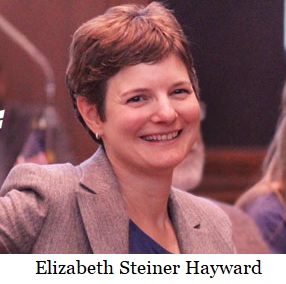
On this day, September 1, 1836, Protestant missionary Dr. Marcus Whitman led a party to Oregon. His wife, Narcissa, was one of the first white women to travel the Oregon Trail.
 Post an Event
Post an Event
| Benton County Republicans’ Private Fundraising Event, “Bent-on Boots and Bling” with Trey Taylor |
| Friday, September 5, 2025 at 5:00 pm |
| Featuring Trey Taylor
Music Private Event
Friday, September 5, 2025 5:00-5:30 pm VIP Reception
5:30-8:00 pm Heavy Appetizers,
Auction, Concert
Red: $750 VIP Reception
Front Row Table Sponsor
White: $500 Table Sponsor
Blue: $50 per person
Limited Seating. Get Yours Now!!!
Support Local
Dress up: Bling, Cowboy, Patriotic Benton County Republican
FUNDRAISER
www.BentonGOP.org
Get your tickets today at:
https://www.bentongop.org/event-details/benton-county-republicans-fundraiser/form
About Trey:
Trey is the youngest African American Man in Country Music History. The Denver Post wrote
"It's impossible to miss his enthusiasm. With a fondness for cowboy boots, gaudy colors and dazzling jewelry, Trey Taylor could stand toe to toe with any of the Pop, Country or even Rap
contemporaries of his generation.“ |
| Trysting Tree Golf Club, 34028 NE Electric Rd., Corvallis |
Are the goal posts going to move again?
Editor's note: A previous version of this article contained a math error. Thanks to a reader for pointing this out. It has been corrected below.
Since her
press conference in which Oregon Governor Kate Brown announced the target of 70% of the population vaccinated, Oregonians crave clarity on two basic issues.
When are we going to reach 70%?
The definition of who is vaccinated is not always made clear. Some reports show number of doses administered, and few count that as being vaccinated. Some count the administration of both doses -- in the case of the Moderna and Pfizer which need two doses -- which probably equals "vaccinated" for most, but the vaccines require that the subject wait two weeks for the vaccine to fully take effect, so for most, the safe definition of "vaccinated" is both doses plus two weeks.
Governor Brown's definition of vaccinated is, in her own words "the number of Oregonians age 16 and older that we need to reach with a first dose."
According to the Oregon Health Authority website as of this posting, 2,150,964 Oregonians have received at least one dose. The US Census Bureau estimates that 20.5% of the population is under 18, which means 17 and younger -- not quite an exact amount to subtract to get 16 and older, but very close. If the population of Oregon is about 4,300,000, that means that The target population is about 3,500,000 and that we are at about 61.4%.
This means we need another 299,036 people to get vaccinated to get to the golden 70%. The OHA reports that it is doing about 30,000 doses per day, and one could conservatively surmise that this number will slip due to the fact that the remaining unvaccinated people are fewer, harder to find, and in many cases harder to convince. If the OHA were to average 25,000 per day, they could get to 70% in a couple of weeks. Governor Brown is "confident we can get there in June."
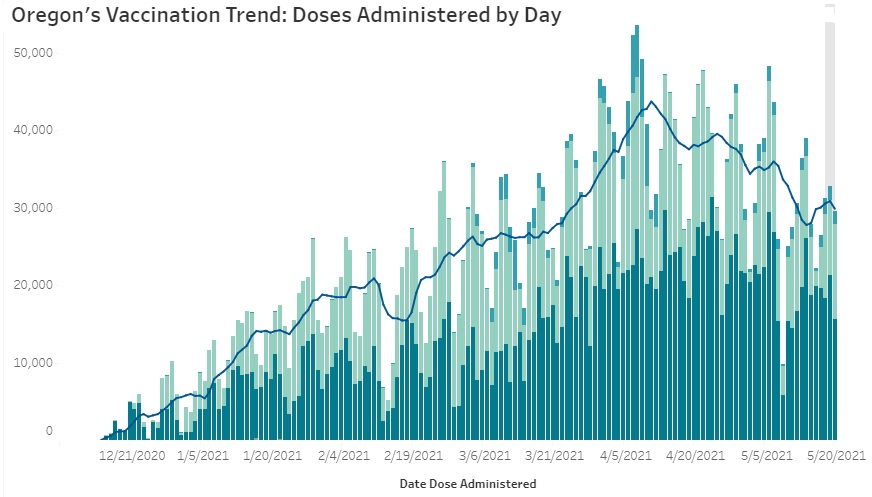 What happens once we reach 70%?
What happens once we reach 70%?

Again, in Governor Brown's words, from her
press conference, "Once we cross that statewide goal, yes, that means, no more county risk levels, and a lifting of most restrictions –– including capacity limits for venues and businesses, and limits on group sizes.
That sounds like good news, but she manages expectations.
Common sense safety measures, like wearing masks and physical distancing may remain in effect, in line with CDC guidance. We will continue to evaluate CDC’s recommendations on these measures and align them with Oregon’s needs. Public health will remain focused on testing, contact tracing, and continuing to monitor hospital admissions so we can do this safely. We still have some work to do to
reach our 70% goal, but I am confident we can get there in June and return Oregon to a sense of normalcy.
Remember, though, this speech was delivered prior to the CDC's declaration that vaccinated persons no longer need to wear masks. Watch for the goal posts to be moved. In the little over a year that COVID-19 has been upon us, we've seen a slew of executive orders and retooling of information.
--Staff Reports| Post Date: 2021-05-22 17:01:23 | Last Update: 2021-05-23 12:57:35 |
No more joking about when to vote
Joking about elections in Oregon may about to become some real serious business.
Legislation is on the horizon which would make communicating false statements about an election illegal and punishable by a fine up to $10,000.
HB 2323 is a bill currently awaiting action in the Senate Committee On Rules. It has a public hearing scheduled on May 25th, although the public is currently not actually allowed to attend.
The legislation is summarized as follows:
Prohibits knowingly communicating materially false statement, including by electronic or telephonic means, with intent to mislead electors about date of election, deadline for delivering ballot, voter registration deadline, method of registering to vote, locations at which elector may deposit ballot, qualifications of electors or voter registration status within 30 days of primary election or special election or within 60 days of general election. Authorizes Attorney General] Secretary of State to prosecute violation and establishes civil penalty of up to $10,000 for violation. Expressly states that current prohibition on circulating materially false statement relating to candidate, political committee or measure includes circulation by electronic or telephonic means. Prohibits printing or circulation of imitation voters' pamphlet unless pamphlet is clearly marked as unofficial. Establishes fine of up to $10,000 for violation.
The bill has bi-partisan support, and is sponsored chiefly by Representative Julie Fahey (D-Eugene) Perhaps it is a good idea, perhaps not. Critics may note the potential for unequal and unequitable application of this law, and the possible danger of selective enforcement. The law may prove to be entirely unenforceable. It seems that Oregon legislators are willing to experiment with how to run the lives of Oregonians these days, so look for this bill to be passed into law in the near future.
--Bruce Armstrong| Post Date: 2021-05-22 11:29:54 | Last Update: 2021-05-22 11:50:24 |
The state had a breach in health data a couple of years ago
As the debate over vaccine passports rages and a cold war between retail businesses and state COVID-19 enforcement officials brews, citizens -- even those who are grateful to get the vaccine -- are starting to question the need for the Oregon Health Authority to collect and store data on their vaccination status.
It's pretty clear from the
form to request a duplicate vaccination status card that the OHA has collected information that could be a significant threat in the case of an identity theft incident.
Two years ago, the Department of Human Services had a breach in which hundreds of thousands of records containing highly sensitive identity information was compromised. The DHS
released a statement, required by law, describing the breach.
On January 28, 2019 DHS and Enterprise Security Office Cyber Security team confirmed that a breach of regulated information had occurred. Nine individual employees opened a phishing email and clicked on a link that compromised their email mailboxes and allowed access to these employees’ email information. Current information indicates on January 8th, a spear phishing email was sent to DHS employees. Through our process of discovery, we learned that there were nearly 2 million emails in those email mailboxes.
The unauthorized access to the affected email mailboxes was successfully stopped. DHS is in the process of thoroughly reviewing the incident and the information involved. This investigation includes clarifying the number of impacted records that might contain personal information of clients receiving services from DHS.
Clients’ Protected Health Information under the Health Insurance Portability and Accountability Act (HIPAA) was accessible to an unauthorized person. Client information may include first and last names, addresses, dates of birth, Social Security numbers, case number and other information used to administer DHS programs.
For some, this is just another argument against vaccine passports and the like, in which the government maintains control of the data.
Photo by Markus Spiske on Unsplash
--Staff Reports| Post Date: 2021-05-21 15:06:25 | Last Update: 2021-05-21 17:11:09 |
Support motion to end COVID-19 state of emergency
Representative E. Werner Reschke (R-Klamath Falls) made a motion for the Legislature to consider a resolution that would end Governor Brown’s COVID-19 emergency orders.
The historically long state of emergency will soon enter its 15th month, despite access to vaccines.
The motion failed on party lines. House Democrats voted against the motion and instead supported continuing the Governor’s unchecked powers. This includes the recent new mandates on businesses to verify vaccination status of employees and members of the public.
“Vaccines are prevalent and accessible,†said House Republican Leader Christine Drazan (R-Canby) in a letter to Governor Brown. “We should be easing restrictions. The choice should be returned to people and businesses so they can follow the latest guidance from the CDC without unwarranted government mandates.â€
Meanwhile, proposals from state legislators across the country are attempting to implement stronger checks and balances which Oregon currently lacks.
“The COVID pandemic has been an impetus for a re-examination of balancing of legislative power with executive powers,†said Pam Greenberg to AP, a policy researcher at the National Conference of State Legislatures.
According to the NCSL, lawmakers in 45 states have proposed more than 300 measures this year related to legislative oversight of executive actions during the COVID-19 pandemic or other emergencies.
HJR 18 was introduced by Representatives E. Werner Reschke (R-Klamath Falls, Mike Nearman (R-Independence), Bill Post (R-Keizer) and terminates state of emergency relating to COVID-19.
--Staff Reports| Post Date: 2021-05-20 14:20:51 | |
Indigenous People should be alarmed
Passed into law this week is a curious bill that pleads for explanation.
HB 2526 passed mostly on party lines with Democrats carrying the torch for Indigenous people. But, do they?
The bill becomes very confusing as to what the real purpose is. The bill is summarized as, “Designates second Monday of October of each year as Indigenous Peoples' Day.†However, in 1971, the second Monday in October became Columbus Day, which was declared a federal holiday In 1937.
Oregon does not observe Columbus Day as a state holiday. So is this an excuse to celebrate the day with the rest of the nation? The bill doesn’t make Indigenous Peoples’ Day a holiday, so it has no more value than Columbus Day has. Or, is the bill using the Indigenous People as a tool to belittle and critic the founding of America? After all, the bill begins with “Whereas Christopher Columbus, a man who is known to have “discovered†the Americas, came upon land that was already inhabited by Indigenous People, his historically cited contributions being either inaccurate or facially not worthy of celebrating; and Whereas Columbus’ voyage to the Americas opened the door to heinous crimes against humanity, including but not limited to the introduction of transatlantic slavery and genocidal acts against Indigenous People.â€
There is a lot to push back on those two statements that are now engrained into Oregon law. For instance, you can’t push the 1619 Project and say Columbus opened the door to heinous crimes against humanity. Even though Columbus has a history of dealing in slave traffic, the Mayflower did not bring slaves to Plymouth Rock.
Indigenous People should be alarmed at how the leadership in Oregon has continuously and slowly included them into Oregon laws and invading their sovereignty to provide services. Being a part of the “underserved†and “underrepresented†is endangering the sovereignty of tribal nations. Tribal nation is used as a tool to control, and given them a used holiday is throwing crumbs of disrespect. So, what was the real purpose of
HB 2526?
Senator Boquist explains it this way: “
HB 2526 replaces Columbus Day with Indigenous Day instead of giving true Native Americans their own holiday. Strange the virtue signally proponents inside the Legislative Assembly did not want to give indigenous people their own day. Instead, they want to revise history. It is inappropriate to only give the first people a ‘hand me down’ day. They deserve better...â€
--Staff Reports| Post Date: 2021-05-20 10:02:01 | Last Update: 2021-05-20 10:42:23 |
“This windfall won’t last foreverâ€
House Republican Leader Christine Drazan (R-Canby) released the following statement in response to the revenue forecast announced today.
“This historic revenue forecast is propped up by massive federal infusions that buoyed Oregon’s economy through the impacts of COVID-19. This windfall won’t last forever. It’s important to commit funds to reserves now along with targeted investments, rather than creating ongoing spending promises we can’t fulfill.
Oregon has the opportunity for one-time spending on wildfire relief and pandemic aid. We should also fully fund schools next year when they need help most. Our kids’ education recovery is critical, and we must give families the choice to return to classrooms full-time. Our state cannot afford to underfund students.
Republicans will be pushing for these investments as we work to balance the budget with healthy reserves while limiting financial burdens caused by unnecessary new taxes or raiding the kicker.â€
--Staff Reports| Post Date: 2021-05-19 18:49:25 | |
“The constitution provides us specific guarantees of libertyâ€
Sandy Mayor Stan Pulliam is announcing a lawsuit to be filed in Federal court on behalf of Heart of Main Street, the Oregon Mom’s Union, and several businesses and individuals. The lawsuit challenges Oregon Governor Kate Brown’s authority to continue using executive action to maintain a state of emergency.
“The constitution provides us specific guarantees of liberty,†stated Stan Pulliam. “The Governor’s broadly applied authority continues to be shrouded in opaque rationale, undisclosed science, and arbitrary metrics. After 14 months, it’s time to put an end to this and restore our constitutionally protected rights as Americans.â€
The announcement will be made outside of Spud Monkeys, a Gresham restaurant and bar owned by Melissa Adams. Late last year, Spud Monkeys was visited by an Oregon Health Authority employee, who ordered a burger and a beer from her restaurant, and then cited her for illegally opening.
The lawsuit will be filed early this week in Federal court by Ed Trompke, an attorney with Portland law firm, Jordan Ramis, PC, seeking to restrain enforcement of the Governor’s order.

“The state of emergency was necessary when we didn’t know anything about the virus,†said Stan Pulliam. “But we now have a vaccine, we understand how it’s transmitted and how it’s not, and we don’t see any discernible difference in outcomes between states that are open and the increasingly few that aren’t.â€
"Parents should not have to go to court to get their kids back to school," said MacKensey Pulliam, board member for the Oregon Moms Union. "We've been given hope time and time again and each time our leaders have broken their promises and failed to get our kids back to school. Parents and kids can wait no longer."
The discovery process of the lawsuit will force the Governor’s office to produce the scientific data Stan Pulliam and others have been demanding for several months, forcing Brown to prove why it has been necessary to lock down main street businesses while big-box stores remain open.
“A governor’s powers in a state of emergency must be narrowly defined and temporary. Instead, they have been broad and ceaseless. It’s clear Governor Brown has no intention of relinquishing this absolute power herself, so we are forced to petition our judiciary branch to do it for her,†concluded Stan Pulliam.
--Staff Reports| Post Date: 2021-05-19 18:40:01 | Last Update: 2022-01-01 18:09:27 |
Republicans Set Priorities For Excess Tax Revenue
According to the Oregon Office of Economic Analysis, Oregon is swimming in money. After devastating lockdowns that have resulted in the highest long-term unemployment rate in nine years, the state still brought in billions over projection, indicating that calls for federal bailouts for state governments were overblown
This will trigger one of the largest kicker refunds in state history at $1.4 billion. That’s enough to give every individual in Oregon $330,
despite Democrat book cooking to keep some of the kicker.
“Money is coming out of our ears. This one-time dump of federal money needs to be used responsibly. We must first ensure taxpayers get their full Kicker. That money belongs to them, and there is no justification to take it from them,†Senate Republican Leader Fred Girod (R-Lyons) said.
After the kicker, the Legislature has a little over a month to appropriate an extra $1.182 billion this budget cycle. Today’s announcement also projects the state to bring in an extra $1.250 billion in the 2021-2023 biennium.
“This money should be directed to Oregonians' most pressing needs. We must fully fund and fully reopen our schools, invest in our workforce, and assist in wildfire recovery efforts,†Senator Girod said.
Senate Republicans are proposing the following allocations from excess revenue that has come into the state:
- Fully fund and fully reopen Oregon K-12 schools with the school districts’ recommended budget of $9.6 billion
- Get our economy back on track by investing $100 million into workforce development and career and technical education programs at our community colleges
- Assist fire devastated communities by allocating $800 million to recovery efforts
--Staff Reports| Post Date: 2021-05-19 18:28:44 | Last Update: 2021-05-19 18:38:04 |
In this case, it’s unwanted and unneeded
On of the police reform bills introduced this session is a ban on police use of
HB 2928 which regulates use of chemical incapacitants, kinetic impact projectiles, sound devices and strobe lights by law enforcement agencies.
Introduuced by Representative Bynum, the bill has been assigned to the Joint Committee on Ways and Means, where no one seems to be paying attention to it. It's co-sponsored by a host of Democrats, including Representative Wlnsvey Campos(D-Aloha), Maxine Dexter(D-Portland), Khanh Pham (D-Portland), Karin Power (D-Portland), Lisa Reynolds (D-Portland, and Andrea Valderrama (D-Portland).
In a recent poll, some similar concepts did not do well. Whan asked if they would like to "prohibit police from using pepper spray except when riots are officially declared," Oregonians were tame to the idea.
| Strongly Support | 23% |
| Somewhat Support | 21% |
| Somewhat Oppose | 17% |
| Strongly Oppose | 30% |
| Don't know | 8% |
In the case of this bill, it passed out of the House Committee on Judiciary, Chaired by Representative Bynum, no less and has now spent more than a month in Ways & Means, where it seems destined to die.
--Staff Reports| Post Date: 2021-05-19 17:03:40 | Last Update: 2021-05-19 18:40:01 |
Mandated requirements for board directors
HB 3110 has passed in the Oregon House of Representatives on party lines and moves to the Senate for consideration. This bill requires board of directors of publicly traded corporation to have at least one female director and one director who is a member of an underrepresented community.
Board composition is ultimately up to a corporation's shareholders votes. Representative John Lively points out, “there is a great deal of evidence showing that these decisions are not always made fairly or with the financial health of the corporation in mind. There is quite a bit of data showing a certain percentage of a Board of Directors being composed of women results in greater profitability, for example, yet a surprisingly high number of Boards still do not include any women.†So, according to Representative Lively, it’s big government’s responsibility to force a more profitable scenario for a corporation.
Lively also says, “HB 3110 preserves the shareholders' choice in Board selection but levees a fine if they decide not to be inclusive in a few specific ways.†If no females run for a board, or shareholders don’t vote for at least one female, it’s a civil penalty of at least $10,000 for publicly traded corporations. Isn’t this voter manipulation, also called voter fraud?
Not to make this bill more confusing, but the bill defines “Female†as meaning an individual who self-identifies as a woman, regardless of the sex assigned to the individual at birth. It seems a man can self-identify as a female or qualify as underrepresented.
Representative David Brock Smith (R-Port Orford) submitted a Vote Explanation:
“Forcing a corporation to have specified proportions of female directors and members of BIPOC communities is not something this legislative body should be doing and as many women and BIPOC leaders have said, this action would diminish the hard work of those that currently hold these positions. A perfect example of this are within this very House of Representatives, where the majority of members are women.â€
The bill degrades females and underrepresented. Women work hard to earn their place and this is offensive and belittling to a woman that would be appointed to a board for any other reason than her ability. The same applies to underrepresented, which is an individual who identifies as having a low income or very low income background, including almost anyone except a straight white person from a moderate to wealthy background, and they should feel the same about their ability to qualify.
It goes against business concept that shareholders electing board members. Shareholders have many interests, but first and foremost it is the financial health of the business. Companies and board members have a fiduciary duty to shareholders to maximize their return on investment. That means that directors are voted on based on whether they will further the goal of benefiting shareholders, not the community at-large. Trying to tie a false sense of equity is government capturing the free market into captivity.
--Donna Bleiler| Post Date: 2021-05-19 09:00:39 | Last Update: 2021-05-19 09:50:29 |
Counties could be required to finance what was enacted by the legislature
Many bills this session have moved through both chambers on party line votes. However, with the Democrat Party in charge there has been little the Republicans have been able to do to stop legislation from moving into law.
SJR 12 introduced by Senator Elizabeth Steiner-Hayward (D–Portland) and Representative Rob Nosse (D-Portland) has been 16 years in the making and pays homage the late Rep. Mitch Greenlick. In 2005, Greenlick filed a petition for the “Hope for Oregon Families†ballot initiative. The HOPE for Oregon Families initiative if passed by the voters would have added Section 46 to Article 1 of the Oregon Constitution stating that: Health care is an essential safeguard of human life and dignity and there is an obligation for the state to ensure that every Oregon resident has access to effective and affordable health care as a fundamental right.
Although it failed to make the ballot it did spark a movement to provide healthcare for all in Oregonians which has partially been adopted through the passage of Cover Oregon, the Federal Affordable Care Act, and the Oregon Healthy Kids program.
Since then, several attempts have been made to pass similar legislation onto the voters for approval. Each of those measurers failed in the legislature despite the Democratic party having control of the House, the Senate and the Governor’s office.
- 2007 (HJR 18) – It moved out of committee on a party line vote and passed the House floor on a party line vote. It was in the Joint Rules committee upon adjournment.
- 2008 (HJR100) – It moved out of committee on a party line vote and passed the House floor on a party line vote. It was in the Joint Rules Committee upon adjournment.
- 2015 (HJR4) – This bill received no committee hearings.
- 2018 (HJR203) – It moved out of committee on a party line vote and passed the House floor on a party line vote. It was assigned to the Senate Healthcare Committee where it received one hearing and was in committee upon adjournment.
- 2020 (HJR202) – It moved out of committee on a party line vote, but never received a vote on the House floor due to the Republican walkout.
During the House floor debate Rep. Brock-Smith (R-Port Orford) reminded his colleagues that “This is not the first time this bill has appeared in this chamber and I think it needs to be said that, with all due respect to the late Representative Greenlick and his body of work for all Oregonians, we have not passed this bill because it is not a good bill and his passing does not make the bill any betterâ€.
However, this time the majority party pushed it over the finish line and
SJR 12 is headed to the voters in November. They will now decide if Section 1 of the Oregon Constitution should be changed to ensure that every resident of the state has access to cost-effective, clinically appropriate, and affordable health care.
If approved by the voters, the aspirations of the resolution will then need to be codified into law by the Legislature. In her remarks during the Senate Floor vote, Senator Steiner Hayward stated “It will require substantial action on the part of this legislature, in consultation with a wide range of experts, to determine the best way to fulfill the requirements put forward in this constitutional amendment. Those legislative actions will then be evaluated as part of the process for their costs and how they will be paid for. In other words, it is aspirational until it is passed by the voters, then it becomes the obligation of the legislature.
Representative Christine Drazen (R-Canby) agreed that sending it to the voters under Section 1 of the Constitution it becomes an obligation of the state if passed. “
SJR 12 is either aspirational or it is a right, it can’t be both†she stated to her colleagues during floor debate. “Upon passage it becomes an obligation of the state of Oregon to provide every resident of the state with access to cost-effective, clinically appropriate, and affordable health care†she concluded.
A D V E R T I S E M E N T

A D V E R T I S E M E N T
If approved by the voters, the Legislature will need to balance it with that of other existing obligations such as funding public schools and other essential public services. However, as noted by the Legislative Council, the state could also be responsible for right of action claims (lawsuits) against the state if they fail to meet that obligation. In their report they stated,
“If SJR 12 is adopted by the voters, the state could be subject to a lawsuit if it fails to satisfactorily implement each resident of Oregon’s fundamental right to access cost-effective, clinically appropriate and affordable health care. The text of SJR 12establishes a state obligation and a corresponding individual right. Further, Sen. Steiner Hayward (D-Portland) acknowledged that an action could be brought against the stateâ€. The concluded that, “We believe a court would likely conclude that subsections (1) and (2) of section 47 (of the SJR 12) read together, along with the legislative history, create a private right that could be enforced in court and that the adoption of SJR 12 by the people constitutes a waiver of sovereign immunity.
In addition, if the voters approve the ballot measure generated by
SJR 12, the Legislature could place the aspirational responsibility onto the counties, cities and other entities. Representative Cedric Hayden (R–Roseburg), who initiated the conversation with Legislative Council, told the members of the House that “It has been stated that this may not cost the state anything. I believe there is a loopholeâ€. Again, he referred to the response from Legislative Council which stated,
“The Legislative Assembly would not be prohibited by the Oregon Constitution from enacting legislation to require county governments to establish and maintain health care delivery systems so that county residents can have access to cost-effective, clinically appropriate and affordable health careâ€.
They also concluded that counties could be required to finance what was enacted by the legislature if it passed the legislature by a 3/5 majority which would remove the unfunded mandate argument.
Many members of both chambers agreed that Oregon can do better when it comes to healthcare services for its citizens, but they disagreed along party lines that
SJR 12 is the answer. The voters will now decide and if passed the Legislature will decide what access to cost-effective, clinically appropriate, and affordable health care means, how to pay for it and what other services within he state budget may need to be reduced.
--Terese Humboldt| Post Date: 2021-05-19 07:59:20 | Last Update: 2021-05-19 18:36:15 |
OSHA, OLCC and BOLI will continue to enforce
The Oregon Health Authority released its new Statewide mask requirements today. Here is what you need to know.
Interim Guidance for Fully Vaccinated Individuals
All businesses, employers and faith institutions are required to continue to apply and enforce the mask, face covering and face shield guidance, and physical distancing requirements in state COVID-19 guidance to all individuals unless a business, employer or faith institution:
- Has a policy for checking for proof of vaccination status of individuals; and
- Requests proof of vaccination status from each individual; and
- Reviews each individual’s proof of vaccination prior to entry or admission
Business that chose not to have a policy for checking proof of vaccine may remain open with face coverings required for all customers.
In a press conference regarding the release of the new options, Dr. Dean Sidelinger, the Director of the Oregon Health Authority (OHA), was asked about the burden this places on businesses to be the ones to ask for proof and then “validate†the proof. He replied “That is why businesses have a choice to wear the mask or ask for customers to show their vaccine card. If it is too hard or they don’t want to review records they can continue to require masks.â€
Dr. Siedlinger was also asked about enforcement and who or what state agencies would be responsible for enforcing the business implementation of vaccine proof for those businesses that chose to drop the masks. He responded that “enforcement will continue to be done like it has been done throughout the pandemic by using existing Executive Order authority which includes the use of the Occupational Safety and Health Agency (OSHA), Oregon Liquor Control Commission (OLCC) and local public health departments. Also, individuals can file complaints and OSHA will follow up on the complaint.
The current enforcement language Dr. Sidelinger was referring to is contained in
Executive Order 20-66, section 10.
10. Enforcement.
a. This Executive Order, the Risk Level Metrics, and any guidance issued by OHA or another state agency designated by the Governor to implement this Executive Order, are public health laws as defined in ORS 431A.005, and may be enforced as permitted under ORS 43lA.010, including but not limited to enforcement via civil penalties as provided in that statute, which has a statutory maximum fine of $500 per day per violation.
A D V E R T I S E M E N T

A D V E R T I S E M E N T
b. In addition to any other penalty that may be imposed under applicable laws, any person, business, or entity found to be in violation of this Executive Order, the Risk Level Metrics, or any guidance issued by OHA or other state agencies to implement this Executive Order, is subject to the penalties described in ORS 401.990, in particular, that any person knowingly violating this Executive Order shall, upon conviction thereof, be guilty of a Class C misdemeanor, which is punishable by up to 30 days in jail or a fine of $1,250 or both.
c. I direct other state agencies with regulatory enforcement authority, including but not limited to Oregon Occupational Safety and Health (Oregon OSHA) and the Oregon Liquor Control Commission (OLCC), to continue their efforts to protect the lives and health of Oregonians by enforcing, under existing civil and administrative enforcement authorities, the directives in this Executive Order, the Risk Level Metrics, and any guidance issued by OHA or other state agencies to implement this Executive Order.
d. I direct the Superintendent of the Oregon State Police to coordinate with law enforcement agencies throughout the state to enforce the directives of this Executive Order, the Risk Level Metrics, or any guidance issued by OHA or other state agencies to implement this Executive Order, as appropriate. It is my expectation that law enforcement agencies will primarily focus on referral to civil enforcement authorities and will reserve criminal citations for willful and flagrant violations of this order.
So, the question is, how will business know if a vaccine card is authentic? Rachel Monahan with Willamette Week also asked Dr. Sidelinger during the press conference about the authenticity of vaccine cards and the fact that they can be easily faked. Dr. Sidelinger responded saying “We are not expecting businesses to check vax cards for authenticityâ€. He went on to add that vaccine proof could be “the actual paper record issued during the vaccination, a copy of the record or photograph of the record on your smart phoneâ€. He also assured reporters that “the proof will NOT be recorded by the business they just need to see itâ€.
The Biden administration has also declared it would not create a federal vaccination database, citing privacy concerns, paving the way for the cards to become the country’s default national way to verify if someone has been vaccinated according to an
NBC News Report on forged vaccine certificates. In addition, in an April 6th press conference, White House Press Secretary, Jen Psaki said "The government is not now, nor will be, supporting a system that requires Americans to carry a credential. Our interest is very simple from the federal government, which is Americans' privacy and rights should be protected, and so that these systems are not used against people unfairly." So, do the new OHA rules go against the federal government and the Biden administration?
In a
press release from the Oregon Senate Republicans, Senate Republican Leader Fred Girod (R-Lyons) said,
“Vaccine passports are completely contrary to Oregonians' sense of privacy,†in a democracy, having to present proper paperwork to engage in everyday activities is a complete violation of public trust and an invasion of privacy. This kind of dictatorial control over the everyday lives of Oregonians must stop. The Governor should immediately rescind this misguided edict and trust Oregonians.â€
The press release went on to say that, to date, Oregon is one of the first, if not the first, to mandate that its residents present credentials to engage in everyday activities without a mask. Struggling small businesses will now need to hire extra staff to question Oregonians’ medical history at these checkpoints or reject scientific recommendations by still mandating masks for vaccinated Oregonians.
--Terese Humboldt| Post Date: 2021-05-19 07:25:44 | Last Update: 2021-05-19 07:59:20 |
Read More Articles






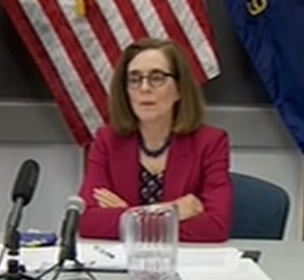

 Again, in Governor Brown's words, from her press conference, "Once we cross that statewide goal, yes, that means, no more county risk levels, and a lifting of most restrictions –– including capacity limits for venues and businesses, and limits on group sizes.
Again, in Governor Brown's words, from her press conference, "Once we cross that statewide goal, yes, that means, no more county risk levels, and a lifting of most restrictions –– including capacity limits for venues and businesses, and limits on group sizes.



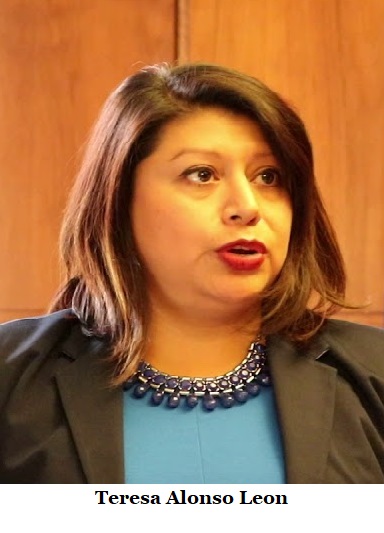

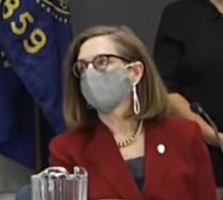
 “The state of emergency was necessary when we didn’t know anything about the virus,†said Stan Pulliam. “But we now have a vaccine, we understand how it’s transmitted and how it’s not, and we don’t see any discernible difference in outcomes between states that are open and the increasingly few that aren’t.â€
“The state of emergency was necessary when we didn’t know anything about the virus,†said Stan Pulliam. “But we now have a vaccine, we understand how it’s transmitted and how it’s not, and we don’t see any discernible difference in outcomes between states that are open and the increasingly few that aren’t.â€



